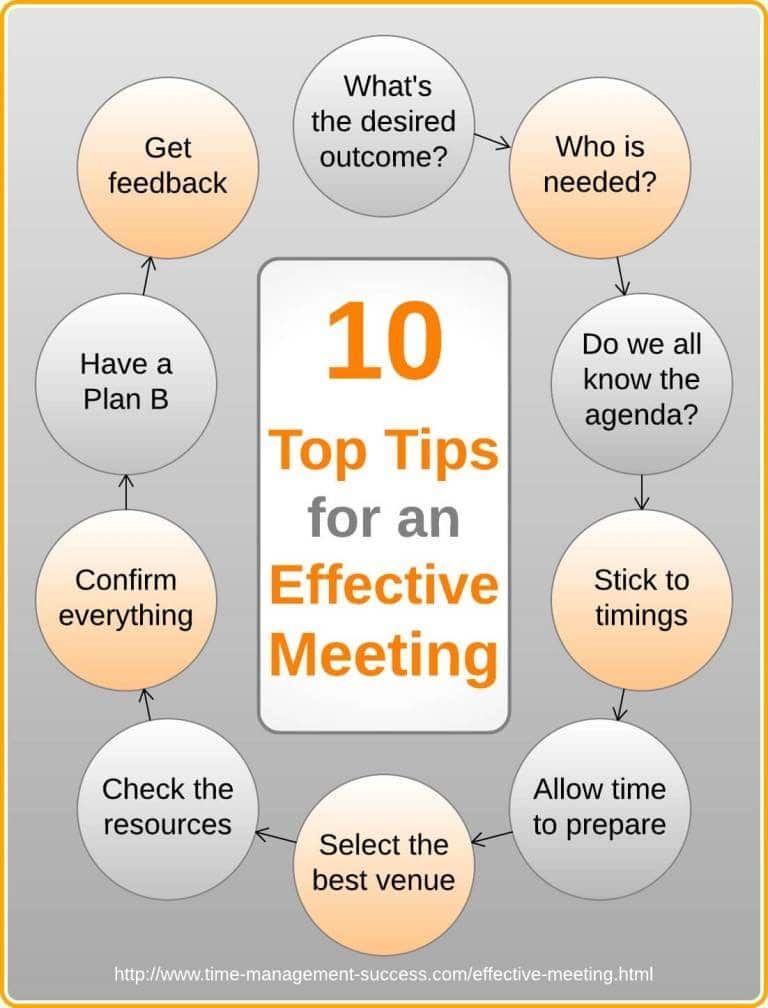Running Effective Sales Meetings

Running Effective Sales Meetings
Anyone who runs or attends a sales meeting will get home and be asked ‘how did it go?’ and you have to avoid the answer being ‘it was a waste of time’. Whether it’s your first time planning a sales meeting agenda or your 100th, we hope to share some tips from our experience and from Salesforce.com that might help you to get the most from your meetings as this is a skill that top Sales Managers should have.
Why hold a sales meeting?
As a sales leader, meetings with your whole team should be a valuable health check for your business. You can pass down company news and hear what is happening on the ground. Your team can bond, share ideas, learn, hear and be listened to. The sales leader can spot challenges, opportunities, emerging talent and threats.
But the time spent preparing for, conducting and following up has a cost and you need to ensure it has meaning and value. This starts with the agenda.
 What is a sales meeting agenda?
What is a sales meeting agenda?
A sales meeting is an internal check-in between sales leaders and practitioners at a company and meant to give sales team members the information they need to do their jobs well. Typically the Sales Manager will run the meeting and Sales Representatives and Agents will attend.
Leaders highlight important updates that could include:
– Current company-wide sales performance
– What’s top of mind for the business
– Competitive insights
– What the team’s next priorities should be
The next 10 tips will help you stay on track, show respect for your team, and be as efficient as possible in your sales meetings.
-
Simplify the agenda and goal
Make sure you and your team know what you’re meeting about in crystal-clear terms.
Don’t call your salespeople together without a clear agenda and a few simple objectives. Pulling salespeople into a meeting takes them away from revenue generating tasks and their time should be respected.
Once you’ve developed your agenda and goals, decide who the best person will be to speak to each topic.
Work with presenters in advance to answer these questions:
– Who will kick off the meeting?
– Who will present?
– How will you handle transitions?
– Will you save questions for the end or answer them throughout?
– Is there a key call to action (CTA) you want every meeting attendee to take?
Send the agenda to attendees ahead of every meeting. It can be a loose outline, but this will show everyone that you’re focused on making solid use of their time.
-
Troubleshoot technology
Whether you are presenting virtually or in person, test the technology and your ability to use it in advance. Assemble the presenters early. It may only take 10 minutes, but it pays off in dividends. If it’s just you running the meeting, you can do the same thing on your own: Test your equipment and go through the presenting motions just as you would during the real thing.
-
Start — and end — on time
Respect your team’s time by keeping the meeting on schedule. Your attendees will have made other arrangements based on the scheduled finish time and too many sales meetings end weakly because people have to drift off to meet other commitments.
If you notice meetings go over, revisit your agenda by asking for attendee feedback to learn which topics are most valuable. You don’t want to cut important conversations short, but you also need to keep an eye on time, and this is a delicate balance.
-
Choose the right frequency
Make the meeting count. If you just need to broadcast information, could you do it in an email rather than getting the whole team together?
If you are covering the same information in every meeting, it is probably too frequent. Don’t feel pressured to meet every time you planned to. If you cancel a meeting because you have nothing to share, this time can be given back to the team and they will appreciate that you’re not holding meetings just for the sake of it.
-
Brief the team
As the leader, it’s your job to update the team on anything you’ve learned that might not have been passed down to them yet, especially if it’s been a while since you last met.
Brief everyone on any pricing changes, stock availability, marketing initiatives, product news, leadership shifts or other integral information that could affect how they sell. Follow up on any issues or questions from past meetings, too. This part of the sales meeting may run for different amounts of time, and if the topic has the potential to run too long, consider having a special sales meeting with only that item on the agenda.

-
Ask the team to discuss their updates and obstacles
When you are all together in a sales meeting, it’s often helpful to have everyone share what’s working and what’s not. Touch base on leads and accounts, how key conversations are going, and everyone’s overall status report regarding hitting their targets and KPIs.
On top of progress, listen for any roadblocks. As a manager, if members of your team are hitting roadblocks, you need to be aware so you can help clear the path.
Once you know what’s going well and what needs additional focus, you can develop an action plan with individual team members or a larger group.
-
Amplify key wins
Did a team member open a new account? Exceed their target six months in a row? Set aside time in your sales meeting agenda specifically to give them kudos. Not only do people often appreciate being recognised, it’s good for the entire organisation.
Recognition is a good motivator for both the individual being recognised and the team. A survey from the Society for Human Resource Management (SHRM) and Globoforce shares that “68% of HR professionals agreed that employee recognition has a positive impact on retention and 56 percent said such programs also help with recruitment.”
Be specific in your praise, too. Saying you appreciate that someone took the time to onboard a client who needs more attention than usual will mean more than a generic “good job.” Of course, not everyone likes being publicly singled out, so make sure you’re giving team members credit in the formats they prefer. You can vet this with each rep in one-on-one meetings.
-
Make space for ideas, questions, and collaboration
Your sales meeting agendas should always include time to exchange thoughts as a group. These meetings aren’t only about what you want to communicate; they’re also a way for team members to learn from each other and build on one another’s best practices.
For example, you may invite brainstorms on:
– Who is achieving best results on new product sales and how?
– What are the biggest objections and how do we overcome them?
– Where are our products in their lifecycles? What’s hot and what’s not?
– What additional support could be provided by the company?
– What are our competitors doing?
– Shaping goals for the next quarter or year
-
Decide on next steps
As you work through each item on your sales meeting agenda, clarify any action items and who’s responsible for following up on each. No one should leave the meeting feeling ambiguous about next steps.
Team members can be responsible for following up with their own prospects and customers. However, the sales leader should take responsibility for department-wide needs raised during the meeting. Make it clear which updates you want the team to bring to the next meeting and always make sure you do what you say you are going to do.
-
Motivate the team

Sales can be hard. This profession is marked by a lot of rejection and patience, and mistakes will be made from time to time. Sometimes the market slows down and prospects just aren’t biting. No matter the reason why times are tough, the team as a whole — or individual sales reps — will struggle sometimes.
During these times, it’s your opportunity as a leader to address issues head on and communicate authentically with the team. If you share why you’re still inspired and motivated about the team’s work, others will be motivated, too. Carve out time in your agenda to do that when times get tough.
And in easier times, use fun and positive ways to motivate your team. Events such as meals, bowling, escape rooms, driving ranges, comedy shows are good ways to say thank you and bond your team such will support each other.
Tough times don’t last, but tough sales teams do.
It goes without saying that your sales meetings can only do so much to inspire your team and sometimes you will identify gaps that can only be met with fresh recruits. You might be interested in our articles about Interviewing techniques and improving your appeal as an employer. Please Contact Us if we can offer any support or advice on any of these topics.

